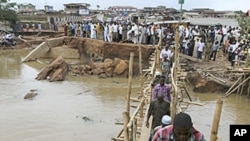Aid agencies say governments in West Africa should be doing a better job preparing for natural disasters by involving more young people and improving the flow of information.
Aid agencies say natural disasters such as drought, flooding, and chronic food insecurity are especially punishing for young people in West Africa. With more than half the region's population under the age of 18, relief officials say governments need to start doing a better job preparing for those disasters.
UNICEF chief of emergency operations for West and Central Africa Grant Leaity says not all preparations are costly.
"There is a lot of preparedness that can be done, which does not actually cost money," said Leaity. "It is more about getting organized. So having a clearly established plan of in the event of, in fact we know these risks are going to come, so when it comes this is now everybody's role. This is who is going to a lead on that. This is what we are going to do in the schools, and that is what we are going to do in the health centers. And this is not happening enough, unfortunately, in the region.”
One of Africa's biggest obstacles is a lack of reliable, timely information.
"The first thing that we have to do is disseminate good information in good time,” said Mie Takaki, Senegal country director for Plan International. "Information can prepare, react, and manage the situation. But when the information is hidden or exaggerated or not disseminated on time, then that is when the disaster happens, especially for these cyclical things.”
Takaki says better information helps aid agencies and local governments improve assistance for those most affected by natural disaster.
"How much water should we expect this year? And how much preparation should I do? And how should I prepare my health post? How should I prepare little ones when they go to school without water?” she said.
Takaki says Plan International is helping neighborhood youth groups in a door-to-door campaign to disinfect public places and demonstrate better hygiene in the fight against cholera.
"We knew the school does not have enough water, but we can not stop children from going to school just because there is a risk of cholera. Right? So then how do we prepare? That becomes the question. Once we ask the right question in the right timing then everybody can unite and prepare and prevent,” said Takaki.
UNICEF's Grant Leaity says disaster risk reduction is a missing piece between long-term development agencies and emergency relief groups who put out humanitarian “fires”.
"For example, think about how could we put communities out of risk or at less risk by building raised schools or health centers or actually even suggesting that people move from one location, which is just inherently at risk and it is going to be increasing so," he said. "These are not things that those firefighters are good at doing. That is not their skill set.”
By involving more young people in disaster preparedness, aid agencies say the impact of famine and epidemics in West Africa can be eased, lowering the loss of life and property damage that most often affect the poorest households.
Aid Agencies: West Africa Needs Better Disaster Preparedness

West Africa Needs Better Disaster Preparedness







